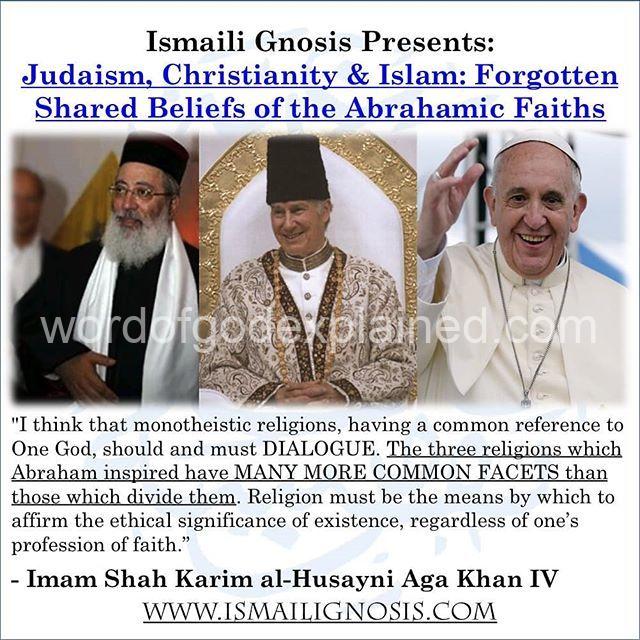
Christianity & Islam: Shared Faith, Common Ground & Dialogue. In today’s article, wordofgodexplained.com will explore with you in the most detailed and complete way. See now!
Shared Foundations: Exploring Common Ground Between Christianity and Islam
Both Christianity and Islam are Abrahamic religions, tracing their roots back to the patriarch Abraham. This common lineage forms a fundamental connection, laying the groundwork for shared beliefs and values. Abraham is revered as a prophet in both faiths, and his story serves as a powerful reminder of the interconnectedness of these traditions.
Both faiths emphasize the importance of monotheism, believing in one God who is the creator and sustainer of all things. This shared belief forms a bedrock upon which many other values and practices are built.
The importance of ethical conduct is another shared principle. Both Christianity and Islam emphasize the importance of living a just and compassionate life, respecting others, and upholding moral values. This emphasis on living a good life, guided by divine principles, is central to both faiths.
Both faiths also place great importance on scripture as a source of guidance, wisdom, and inspiration. The Bible is the sacred text of Christianity, while the Quran is the sacred text of Islam. Although there are clear differences in their interpretations and teachings, both scriptures contain important lessons about faith, morality, and the nature of God.
Comparing and Contrasting Scriptures
While the Bible and the Quran share some common themes, there are also significant differences in their interpretations of historical events and theological doctrines. For example, while Christians believe that Jesus is the Son of God and the Messiah, Muslims believe that he was a prophet of God, but not divine. These differences are important to acknowledge, but they should not be used to create barriers to understanding and dialogue.
Bridging the Gap: Addressing Challenges to Dialogue and Understanding
The history of relations between Christians and Muslims has been marked by periods of conflict, as well as moments of collaboration and peaceful coexistence. It’s essential to acknowledge these historical complexities and understand how they have contributed to existing misunderstandings and prejudices.
Misinterpretations and Stereotypes: Combating Misconceptions
One of the biggest challenges to understanding between Christians and Muslims is the prevalence of negative stereotypes and misconceptions. For example, some people mistakenly believe that all Muslims are extremists or that Islam teaches violence. These stereotypes are harmful and inaccurate, and they can create barriers to meaningful dialogue.
Navigating Theological Differences: A Path of Respectful Understanding
While there are important theological differences between Christianity and Islam, it’s crucial to approach these differences with respect and understanding. These differences should not be seen as insurmountable barriers to dialogue, but rather as opportunities to learn from each other and deepen our understanding of both faiths.
The Power of Dialogue: Building Bridges Between Christianity and Islam
The Importance of Interfaith Engagement
Interfaith dialogue is a powerful tool for promoting understanding, dispelling misconceptions, and building trust between different faith communities. By engaging in open and respectful dialogue, Christians and Muslims can learn from each other, build bridges of understanding, and work together to create a more peaceful and harmonious world.
Principles of Effective Interfaith Dialogue
Meaningful interfaith dialogue requires a commitment to several key principles, including:
- Respect: Recognizing the value of all faiths and treating each other with dignity and respect.
- Empathy: Trying to understand the perspectives and beliefs of others, even if you don’t agree with them.
- Active Listening: Paying attention to what others have to say and seeking to understand their points of view.
- Willingness to Learn: Maintaining an open mind and being willing to learn from others, even if it challenges your own beliefs.
- Open-mindedness: Being open to new ideas and perspectives, and willing to change your own views based on new information.
Practical Strategies for Building Bridges
There are several practical ways to foster interfaith dialogue and understanding:
- Community Gatherings: Organize events and gatherings where Christians and Muslims can come together, share their experiences, and build relationships.
- Educational Programs: Develop programs and resources that educate people about different faiths, dispelling misconceptions and promoting understanding.
- Collaborative Projects: Engage in collaborative projects that bring together members of different faith communities, working together to address common issues or promote peace and understanding.
- Informal Discussions: Encourage informal conversations and discussions between individuals from different faiths, fostering personal connections and building relationships.
A Future of Understanding: Fostering Peace and Coexistence
The need for understanding and tolerance between Christians and Muslims is more important than ever. In an increasingly interconnected world, it’s crucial to build bridges of understanding and cooperation, promoting peace and harmony between different faith communities.
The Role of Individuals in Promoting Dialogue
Each individual has a role to play in promoting understanding and tolerance. We can all take steps to challenge stereotypes, engage in meaningful dialogue, and build relationships with people from different faiths. By working together, we can create a more inclusive and harmonious society.
The Need for Continued Learning and Growth
The journey toward understanding and tolerance is ongoing. We must continue to learn about different faiths, engage in dialogue, and be open to new perspectives.
A Hopeful Vision for the Future
Despite the challenges, there is hope for a future where Christians and Muslims can live together in peace and understanding. By embracing dialogue, promoting tolerance, and working together to build a more just and compassionate world, we can create a future where our differences are celebrated and our common humanity is recognized.
Conclusion
Exploring the shared foundations, values, and scriptures of Christianity and Islam is a journey of discovery and understanding. As you continue your own journey of learning and understanding, consider visiting wordofgodexplained.com for more valuable information.
And remember, we are all part of the human family, and we have a responsibility to promote understanding and peace between all people, regardless of their faith. I encourage you to leave a comment, share this article, or explore other resources on my website.
Author: Bible
Website: wordofgodexplained.com
FAQs:
What are some key shared values between Christianity and Islam?
Both Christianity and Islam are monotheistic religions, believing in one God who is the creator and sustainer of all things. They also share a strong emphasis on ethical conduct, emphasizing the importance of living a just and compassionate life, respecting others, and upholding moral values.
How do Christians and Muslims interpret scripture differently?
While both faiths hold their scriptures as sacred and authoritative, there are significant differences in their interpretations of certain passages, particularly those relating to the nature of God, the role of prophets, and the relationship between faith and reason. For instance, Christians believe that Jesus is the Son of God and the Messiah, while Muslims believe that he was a prophet of God, but not divine.
What are some examples of successful interfaith initiatives?
There are many examples of successful interfaith initiatives around the world, such as:
- The World Council of Churches: This organization fosters dialogue and cooperation among various Christian denominations and other faith groups.
- The World Religions Peace Council: This organization promotes peace and understanding between different religions through dialogue and collaboration.
- Interfaith Centers: These centers offer opportunities for members of different faith communities to come together for dialogue, study, and service.
How can I contribute to interfaith understanding?
You can contribute to interfaith understanding in many ways, including:
- Engage in dialogue: Seek out opportunities to talk with people from different faiths and learn about their beliefs.
- Challenge stereotypes: Speak out against harmful stereotypes and misconceptions about different religions.
- Support interfaith initiatives: Volunteer with or donate to organizations that promote interfaith dialogue and understanding.
- Educate yourself: Learn about different faiths and cultures through reading, attending lectures, or taking classes.
Why is interfaith dialogue important?
Interfaith dialogue is essential for building understanding and trust between different faith communities. It helps to bridge divides, dispel misconceptions, and promote a more peaceful and harmonious society.
EAVs:
- Abraham | Role | Patriarch of Abrahamic religions
- Bible | Language | Hebrew and Greek
- Quran | Language | Arabic
- Jesus | Role in Christianity | Son of God, Savior
- Muhammad | Role in Islam | Prophet of God
- Monotheism | Definition | Belief in one God
- Interfaith Dialogue | Goal | Promote understanding and peace
- Religious Tolerance | Principle | Accepting different faiths
- Cultural Understanding | Importance | Bridging divides
- Shared Values | Examples | Monotheism, justice, ethics
- Theological Differences | Example | Nature of God, role of Jesus
- Religious Texts | Importance | Guidance and inspiration
- Prophets | Role | Messengers of God
- Historical Conflicts | Example | Crusades, Middle Eastern conflicts
- Misunderstandings | Source | Lack of knowledge, stereotypes
- Stereotypes | Impact | Hinder dialogue and understanding
- Conflict | Resolution | Through dialogue and peaceful means
ERE:
- Christianity | Has | Bible
- Islam | Has | Quran
- Jesus | Is | Son of God in Christianity
- Muhammad | Is | Prophet of God in Islam
- Abraham | Is | Patriarch of Judaism, Christianity, and Islam
- Moses | Is | Prophet in Judaism, Christianity, and Islam
- Interfaith Dialogue | Aims to | Bridge religious divides
- Religious Tolerance | Promotes | Acceptance of different faiths
- Cultural Understanding | Enhances | Peaceful coexistence
- Shared Values | Contribute to | Mutual respect and understanding
- Theological Differences | Can | Lead to misunderstandings
- Religious Texts | Offer | Guidance and inspiration
- Prophets | Serve as | Messengers of God
- Historical Conflicts | Result in | Distrust and prejudice
- Misunderstandings | Stem from | Lack of knowledge and stereotypes
- Stereotypes | Perpetuate | Negative perceptions
- Conflict | Requires | Dialogue and peaceful resolution
- Interfaith Organizations | Facilitate | Dialogue and understanding
- Religious Scholars | Contribute to | Theological discussions
- Religious Leaders | Promote | Tolerance and peaceful coexistence
Semantic Triples:
- Christianity | has founder | Jesus
- Islam | has founder | Muhammad
- Bible | is sacred text of | Christianity
- Quran | is sacred text of | Islam
- God | is worshipped by | Christians and Muslims
- Jesus | is considered | Son of God in Christianity
- Muhammad | is considered | Prophet of God in Islam
- Abraham | is considered | Patriarch of Abrahamic religions
- Moses | is considered | Prophet in Judaism, Christianity, and Islam
- Interfaith Dialogue | aims to | promote understanding and peace
- Religious Tolerance | promotes | acceptance of different faiths
- Cultural Understanding | enhances | peaceful coexistence
- Shared Values | contribute to | mutual respect and understanding
- Theological Differences | can lead to | misunderstandings
- Religious Texts | offer | guidance and inspiration
- Prophets | serve as | messengers of God
- Historical Conflicts | result in | distrust and prejudice
- Misunderstandings | stem from | lack of knowledge and stereotypes
- Stereotypes | perpetuate | negative perceptions
- Conflict | requires | dialogue and peaceful resolution





